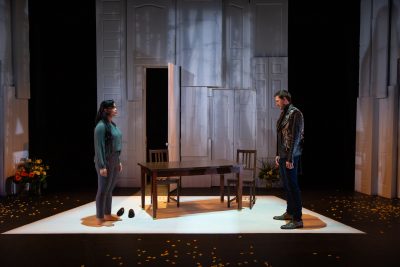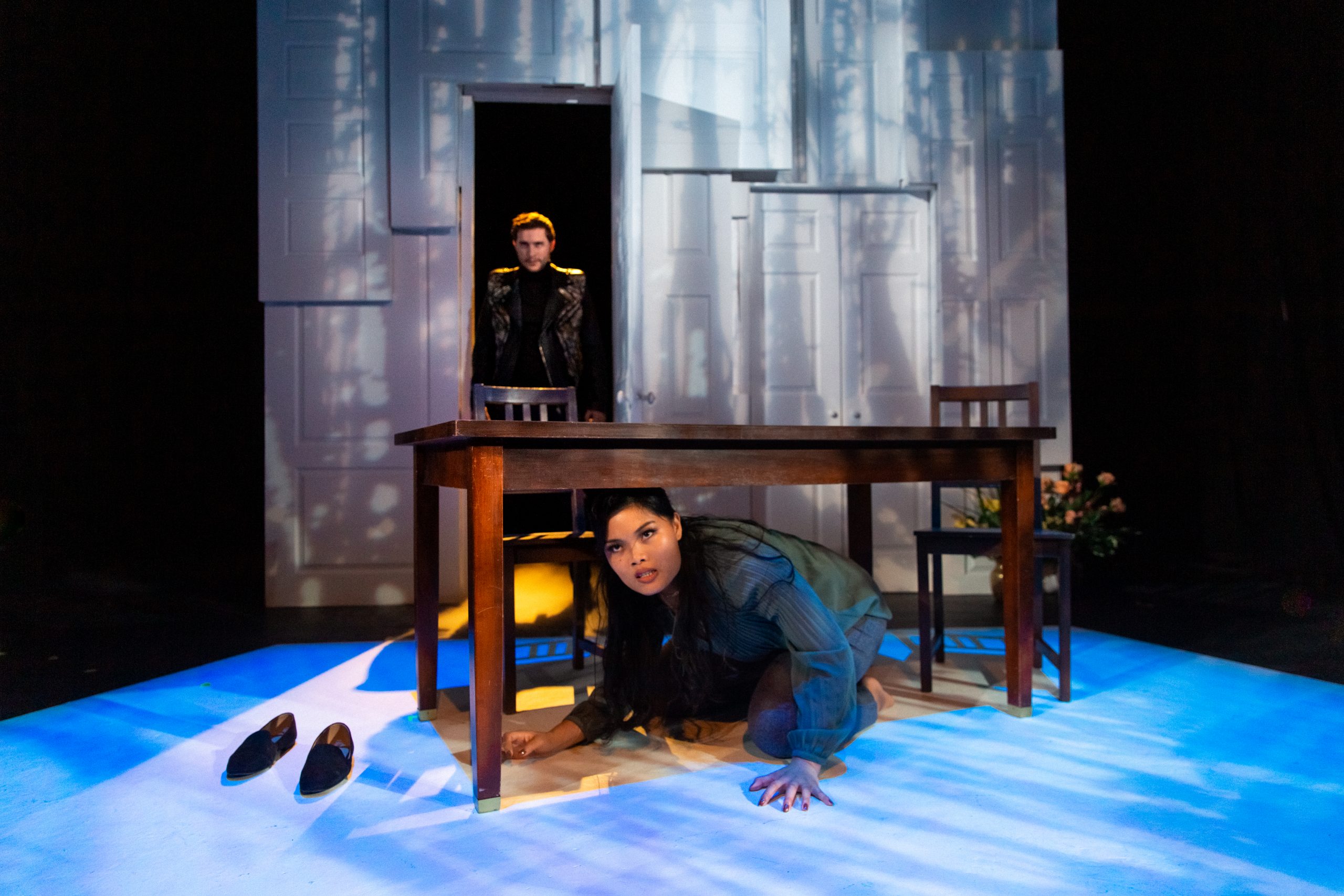Play Review: Egress
Performance & Theatre
Worried that the seemingly random blizzard would deter me from being able to attend Egress at Salt Lake Acting Company, I was delighted when it was only lightly drizzling on my way inside. The lobby was full of warm smiles (albeit covered in masks) and patrons grabbing their tickets. I sat in the theater and eagerly awaited the dimming of the lights.
Melissa Crespo and Sarah Saltwick gave a brief introduction. Egress is a psychological thriller about a woman (and, in some instances, you), who is an expert in safety working as an architectural professor at a prestigious university. Plagued with trauma from a past relationship, the now sleepless woman no longer feels safe. Through visually portrayed intrusive thoughts and hallucinations, the audience begins to feel the uncertainty of the woman’s fate, as well as the mounting direction of the play. As the woman strives for a sense of security, she goes to drastic measures, perusing the Facebook marketplace for a means of protection. This proves difficult for the woman. We, as the audience, see this woman unravel before us, and this is highly relatable—everyone wants to feel safe. For a psychological thriller, these tones are characteristic of the genre because they’re necessary. Egress literally had me at the edge of my seat.

Surprisingly, the cast of Egress is a small one. I say surprisingly because each character has a drastically different personality from one another, but the audience can see that the same actors play multiple characters. Reanne Acasio plays the woman/you, Topher Rasmussen plays the man, or several men, and Vee Vargas plays a second woman role. This cast is not new to the theater scene as they each have performances put on by Salt Lake Acting Company in their repertoire.
I was astounded at the chemistry between the three actors on the stage, especially the interactions between Acasio and Rasmussen. Rasmussen plays a student, a friendly kindergarten teacher and the terrible ex-boyfriend of the woman (Acasio). Despite the differing personalities between the characters, Rasmussen manages to distinctly define them in his mannerisms and tone. This is by no means to diminish the importance of Vargas’ characters in Egress as they prove themselves to be the catalyst for the woman’s feelings of insecurity, which the audience begins to see visually and thematically throughout the performance. The lawyer and the roommate, both played by Vargas, are key players in the woman’s building anxiety. Acasio’s performance floored me. I was able to get a sense of genuine fear, and that isn’t so easily done in a space where there are no actual risks.
In order for a successful performance, the actors must be accompanied by their equally important stage design. Upon first glance, there are three walls surrounding the stage with a few feet of space between each one and each made out of a collage of stylistically different doors. This does not clearly pertain to the story until the audience is treated to projection slides shown behind Acasio. She is playing two different roles—but not in a traditional sense. Acasio plays a character and plays as you. This interesting storytelling method is represented by a few sprinkled scenes in which she delivers narrative through the second person perspective with “you” and “your”, expanding the feeling as if the audience is the one who has experienced these things. The richness of this alternate perspective enticed my intrigue and growing anxiety about coming events.

A projected image of the Winchester House appears before the audience and Acasio, as the woman, questions Susan Winchester’s choice to include approximately two thousand doors in the home. The woman’s anxiety increases as she questions why there were so many points of entry. Too many ways in, too many ways out. The tone conveys this is a sore subject for the woman as, throughout the play, Acasio mentions her ideal safe space would be a bedroom within a larger room with one single door. “One way in, one way out,” she says as the stage lights glisten in her eyes. The audience can see how this seemingly simple detail disturbed her to the point of obsession. Eerie music ques build tension, with blue-green lighting during the woman’s intrusive thoughts and a dream sequence containing swampy visuals with seeping fog over the stage floor.
As a psychological thriller, Egress makes use of the brilliant cast, simplistic but meaningful set design and various small effects that further supplement each scene of the performance to create a spectacular show full of mystery and intrigue. Erase all expectations when entering Salt Lake Acting Company to see Egress—they will be easily exceeded.
In-person performances of Egress will continue until Feb. 27. Egress will also be available for streaming from Feb. 21–Mar. 6. Purchase tickets at saltlakeactingcompany.org. – Brittnie Gallegos

